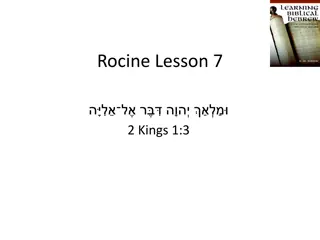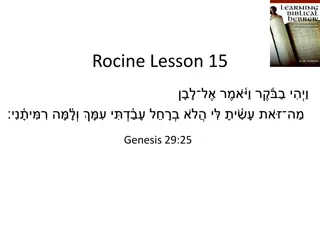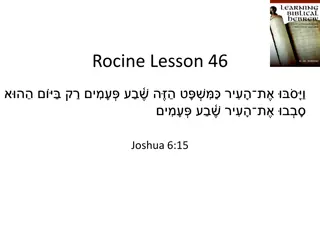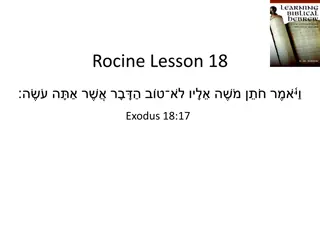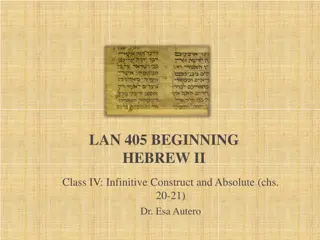Hebrew Language Learning Resources
Explore various Hebrew language learning resources including imperatives, jussives, cohortatives, songs, greetings, time expressions, and vowel pronunciation. Enhance your understanding of Hebrew through interactive lessons and cultural insights.
Download Presentation

Please find below an Image/Link to download the presentation.
The content on the website is provided AS IS for your information and personal use only. It may not be sold, licensed, or shared on other websites without obtaining consent from the author. Download presentation by click this link. If you encounter any issues during the download, it is possible that the publisher has removed the file from their server.
E N D
Presentation Transcript
Chapter 11: Imperatives, Jussives, Cohortatives
as one brothers dwell How good and pleasant it is when brothers live together in unity! and how pleasant how good behold (repeat) Chorus: How good when brothers live together in unity! How good when brothers live together in unity!
4.L. Sing: Shema lullaby (Deut. 6:4) https://www.youtube.com/watch?v=pIOpZ9fQLbU&t=0s&list=PLnNXzYjQerJia_ 8yTy8OrM2K-BiN5OEup&index=2 or search Youtube for: Shema Lullaby Judy Ginsburgh Shabbat Shalom Medley https://www.youtube.com/watch?v=- MBgACM_LcE&list=RDEMSL0J_ngrs5U8EoQWZITH5w&index=9
5.I. Oseh Shalom He who makes peace in his high places may he let peace descent on us and on all Israel and say, say: Amen.
5.I. Oseh Shalom May he make peace, may he make peace Peace for us and for all Israel
Speak Hebrew good morning Hello it going how s thanks okay How s it going? All, Good-bye
8.J. Speak: Lesson 8 Imperfects , Yes, how much is it? , I don t have any, I m sorry ? All right Enough/stop it Good-bye
10.H. Speak: Lesson 10 Days and times What time is it today? ? It is Thursday evening. Wednesday was yesterday. . No, Friday morning is tomorrow. Perhaps we will come Sunday afternoon. Good night, it s really Monday , No, good morning Tuesday. . , , ,
Vanquishing the Vowel Long ( ) BAh -- Q me ( ) Bay er (Y d) Bee -- req Y d ( ) Bow lem (V v) Booh req (rule) Short bAh -- Pata ( ) Beh Segh l (Y d) Bi(t)-- req Bow-- Q me at f Booh-- Qibb Beh vocal ev Half Bah -- at f-pata Beh at f-Segh l Vowel Type A - type E - type I - Type O - Type Bow-- at f Q me U - Type - ( ) Bah-v silent ev
Qal Perfect Chant 1 CP we guarded 1CS I guarded 2 MP you (m.) guarded 2 MS you (m.) guarded 2 FS 2 FP you (f.) guarded you (f.) guarded 3 MS 3 CP they guarded he guarded 3 FS she guarded
Noun Chant Masculine Feminine Dual:
Chant Personal Pronouns 1stcommon I we 2ndmasc. you (m.) you /ye / you all (m.) 2ndfem. you (f.) you / ye / you all (f.) 3rdmasc. he / it they (m.) 3rdfem. she / it they (f.)
Chant: Preposition with Pronominal Suffixes 1 CS in me 1 CP in us 2 MS in you (m.) 2 MP in you (m.) 2 FS in you (f.) 2 FP in you (f.) 3 MS in him 3 MP in them (m.) 3 FS in her 3 FP in them (f.)
Demonstrative Pronouns: this and that This / these that / those who, which / /
Qal Imperfect Chant 1CS 1CP 2MP 3MP 2MS 2FS 2FP 3MS 3FS 3FP
9. F. Chant: Qal Perfect Weak Verb Ayin-Y d/V v L med-H to rise to build to give (3fs) 1CS 2MP 3CP
10.B. Chant: . P position--weak guttural Regular P -N n, P -Y d, P - lef P -Guttural 2MS/3FS
10.C. Chant II. Ayin position weak guttural: Regular Ayin-Y d/V v Ayin guttural Double Ayin 2MS/3FS
10.D. Chant: III. Lmed position: Regular L med-H L med-guttural L med- lef 2MS/3FS
11. A. Vv Consecutive / Conjunctive Imperfect Hebrew narratives will often begin with a perfect verb form followed by a sequence of imperfect verbs linked together via the use of a v v consecutive ( [vav + pata + dagesh forte] cf. the definite article onto the front of each successive imperfect verb. The v v consecutive + Imperfect verbs are translated as past tense or as perfects. ) tagged
11. A. Vv Consecutive / Conjunctive Imperfect The v v consecutive converts or flips their translation from imperfect which is often translated as a future into the past tense matching the open perfect verb that it follows sequentially. It is still possible to add a regular v v conjunctive to the prefix with a simple ev without the shift in tense ( and you will keep/guard ).
Paradigm for the Qal Imperfects with v v consecutive: 1CS and I kept 1CP and we kept 2MS and you (m.) kept 2MP and you (m.) kept 2FS and you (f.) kept 2FP and you (f.) kept 3MS and he kept 3MP and they (m.) kept 3FS and she kept 3FP and they (f.) kept Note in the 1CS form the v v is added with a q me as the lef cannot take the dagesh so the pata is lengthened to the q me .
Paradigm for the Qal Imperfects with v v consecutive: Weak verbs often are shortened when the v v consecutive is added. So in the middle weak verbs (e.g. medial weak vowel is dropped (e.g. ). , , ) the In the lamed h verbs (e.g. [to answer] is often dropped and the initial consonant takes a segh l or pata if it is guttural ( and ). Quite often a narrative featuring the past tense will begin with (and it came to pass). ) the final h ,
11. B. Vv Consecutive / Conjunctive Perfect When a perfect tense or suffixing verb is prefixed with a v v consecutive it is translated as if it were an imperfect and I will guard 1CS 2 MS and you (m.) will guard 2 FS and you (f.) will guard 3 MS and he will guard 3 FS and she will guard
11. B. Vv Consecutive / Conjunctive Perfect 1 CP and we will guard 2 MP and you (m.) will guard 2 FP and you (f.) will guard 3 CP and they will guard As with the imperfects with the v v consecutive the perfect sequence may also begin with a and it will be. Note that in the 2MP and 2FP with the heavy sufformatives and the v v consecutive is added with a instead of a .
11. C. Qal Imperatives Imperatives are used most frequently to express a command but may also be used to express a request or to give permission. In Hebrew the imperative only has four forms that are all in second person (2ms, 2fs, 2mp, 2fp). is often coupled with an imperative adding the sense of please would you.
11. C. Qal Imperatives Imperfect Imperative [you will guard] [guard!] [guard!] [guard!] 2ms 2fs [you will guard] [you will guard] [you will guard] [guard!] 2mp 2fp
11. D. Learn the following chant for : Imperative chant 2ms [you, m.s.] guard 2mp [you m.p.] guard 2fs [you, f.s.] guard [you f.p.] guard 2fp
11. E. Weak verb variations on the imperative to say 2ms [you, m.s.] say 2mp [you m.p.] say [you, f.s.] say to go [you f.p.] say 2fs 2fp 2ms [you, m.s.] go [you, f.s.] go 2mp [you m.p.] go [you f.p.] go 2fs 2fp
11. E. Weak verb variations on the imperative to give 2ms [you, m.s.] give 2mp [you m.p.] give [you f.p.] give 2fs [you, f.s.] give 2fp to take 2ms [you, m.s.] take [you, f.s.] take 2fp 2mp [you m.p.] take [you f.p.] take 2fs
11. E. Weak verb variations on the imperative P N n to fall 2ms [you, m.s.] fall [you, f.s.] fall 2mp [you m.p.] fall [you f.p.] fall 2fs 2fp
11. E. Weak verb variations on the imperative P Y d to sit, dwell 2ms 2mp [you m.p.] sit [you f.p.] sit [you, m.s.] sit [you, f.s.] sit to know 2fs 2fp 2ms [you, m.s.] know [you, f.s.] know 2fp 2mp [you m.p.] know [you f.p.] know 2fs
11. E. Weak verb variations on the imperative Middle weak to come 2ms [you, m.s.] come 2mp [you m.p.] come [you, f.s.] come 2fp to rise [you, m.s.] rise [you, f.s.] rise [you f.p.] come 2fs 2mp [you m.p.] rise [you f.p.] rise 2ms 2fs 2fp
11. E. Weak verb variations on the imperative L med H to go up 2ms [you, m.s.] go up 2mp [you m.p.] go up [you, f.s.] go up to build [you f.p.] go up 2fs 2fp 2ms 2mp [you m.p.] build [you f.p.] build [you, m.s.] build [you, f.s.] build 2fs 2fp
11. F. Jussive While the imperatives work with the second person commands and entreaties, the jussive focus on the third person both singular and plural. The form of the jussive is often the same as the normal imperfect. If the verb is initial in the sentence it is often a jussive if later in the sentence it is a normal imperfect. Context deteremines meaning. With weak verbs the jussive form may be shortened (dropping of the final h for example. .
11. F. Jussive Jussives are frequently translated with the use of may or let expressing a wish, desire or even a command The particle of entreaty may be attached to the jussive verb just like the imperative and cohortative with a maqq f ( , please stay).
11. F. Jussive For the negation the jussive usually employs rather than . The context will have to be used to indicate whether it is a regular imperfect or a jussive but frequently the jussive form is used as the initial word in the sentence or clause whereas the imperfect will often be found later in the sentence.
11. G. Cohortative The cohortative verbs are volitional verbs engaging the first person imperfect forms (singular/plural). It is often translated by Let us (1cp) or May I (1cs). It is sometimes identical to the 1cs/1cp of the imperfect verb It is triggered often as it is the initial verb in the sentence or clause whereas the imperfect verb will often be later in the sentence flow following other words in the sentence or clause. It also will sometimes occur with the volitional particle and be negated by a rather than the usual negation
11F. Chapter 11 Qal Imperative, Vocab / no, nothing 847 to eat 816 people, nation 552 if, whether, interrogative 738 Judah 819
11F. Chapter 11 Qal Imperative, Vocab Jerusalem 643 thus, here, now 576 to carry, lift, raise 656 to pass over, transgress 623 to set, put, lay 584
10.G. Chapter 10 Vocabulary List lad, youth, attendant to build to miss, sin, offend to die
10.G. Chapter 10 Vocabulary List to find to fall to go up, ascend to stand
10.G. Chapter 10 Vocabulary List to rise, arise, stand to send, stretch out, dismiss
9.G. Chapter 9 Vocabulary List to come in, enter, bring in to know to go out to sit, dwell
9.G. Chapter 9 Vocabulary List to take to turn, return, repent to give to do, make
9.G. Chapter 9 Vocabulary List to call, announce to see, understand
8.I. Chapter 8 Vocabulary List after, behind no, not, nothing to bless, praise David
8.I. Chapter 8 Vocabulary List also, even, moreover what? how? to rule, be king to visit, number, appoint
8.I. Chapter 8 Vocabulary List under, below Moses












